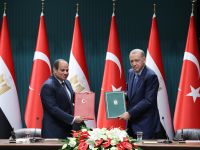Top U.S. negotiator: if we get an Iran deal, the world will “judge it as a good thing”
Obama’s top Iran negotiator Wendy Sherman spoke back to US Congress Republicans who plan on breaking up the much-anticipated nuclear deal after Obama leaves his office in 2016 – a plan meant to discourage Iran from coming to the negotiating table in the first place. Though Republicans acknowledged they can’t prevent Obama from negotiating a deal, the threat of a possible deal falling apart at the start of the new president’s term presents significant concern to Iran’s Supreme Leader. Sherman countered mounting criticism surrounding the potential deal, arguing that a US-Iran agreement “is the way that will ensure that Iran cannot acquire a nuclear weapon.”
Source: Foreign Policy Middle East Channel
In Algeria, women imams battle Islamist radicalization
Algerian mother Samia began to worry when her 17-year-old daughter, despite growing up in a moderate family, began wearing a “full Islamic veil” and disapproving of watching television and taking part in various social activities. Samia went to a female imam for counselling to help her daughter resume her normal life and return to school.
Since Algeria’s civil war, which gripped the country in the 1990’s, female religious guides called mourshidates have been counselling other women and spreading a doctrine of moderate Islam. They fear the effects of the growing Daesh extremist organization, as well as other extremist groups, and work to combat radicalization, especially amongst easily impressionable youth like Samia’s teenage daughter.
Source: Your Middle East
The Islah party in Yemen: game over?
Islah Party, considered to be Yemen’s branch of the Muslim Brotherhood has been marginalized in the wake of the Houthi takeover.
Though Islah attempted to project a moderate and democratic image during the transition period after the fall of former president Salih, their feud with the Houthis has largely left the Houthi movement without a “moderate” Sunni competitor in the political sphere.
If Islamist movements like Islah continue to be marginalized, Sunni jihadist groups who see the crisis in starkly sectarian terms may emerge as competitors to the Shiite Houthis.
Source: Muftah







